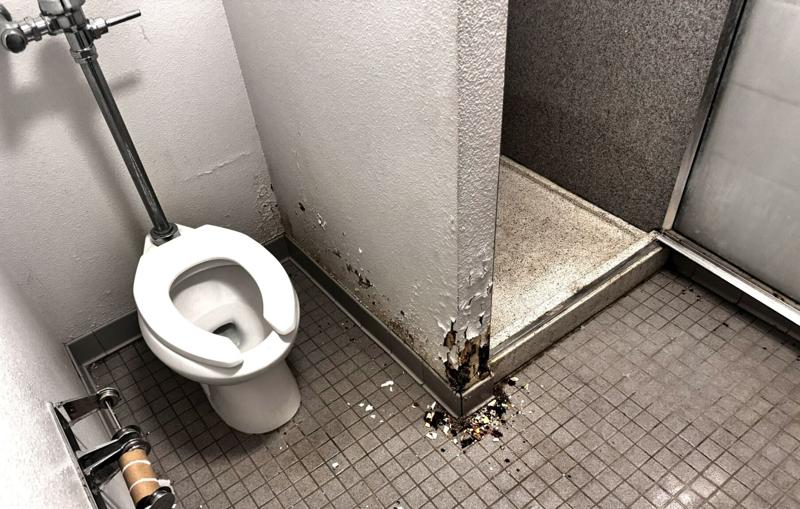An app that allows U.S. service members to anonymously post photos of the conditions in military barracks and dining facilities includes images of mold, mice, maggots, cockroaches, brown tap water and broken AC units, among other problems.
The app, called Hots&Cots, allows registered users to post photos and rate facilities with up to five stars. Founder Rob Evans created the app more than a year ago after a Congressional watchdog called attention to longstanding problems with housing for junior enlisted service members. He said the goal is to push the U.S. Department of Defense to improve conditions, something it promised to do after the 2023 report.
Photos posted on Hots&Cots show maggots at the Army’s dining facilities at Fort Liberty in North Carolina along with thermostats with a reading of 90 degrees indoors. At Fort Moore in Georgia, one user posted a photo of brown water coming out of a bathtub. Another shows moldy cream cheese at a dining facility in New Jersey.
The U.S. Department of Defense did not immediately respond to a request for comment regarding the photos posted on the app.
The site includes dozens of photos of moldy or inedible offerings at military dining facilities across the country. Thermostat photos with uncomfortable temperatures also are common on the site. So are moldy beds. One video on the site shows a service member returning from overseas to a bed covered in mold.
The Center Square wasn’t able to independently verify photos provided to the site, but Evans said the site reviews posts for accuracy.
Evans, a veteran, said he started the app after the 2023 report from the Government Accountability Office.
The 118-page report from the U.S. Government Accountability Office laid bare the conditions of the barracks that house some military service members. The report detailed sewage backups, rodent infestation, mold and inoperable fire suppression systems among the safety hazards that U.S. service members living in barracks face. The report found that such conditions undermine military readiness.
After that report, Brendan Owens, assistant secretary of Defense, Energy Installations and Environment and Chief Housing Officer, said the department had failed the troops and vowed to make improvements.
The GAO report, which included photos of the conditions in some barracks, prompted Congressional hearings and a Pentagon pledge to do better.
Evans started Hots&Cots after the report as a way to resolve housing problems for troops faster. And while he’s seen improvement over the past year, he said not enough has been done and plans to improve facilities could take years.
“We’re almost a year into this and we’re still not making a lot of progress on the existing infrastructure for our junior enlisted service members,” he said.
Evans said the Pentagon needs to take action.
“The Department of Defense must act sooner rather than later to address the quality of life issues facing our service members,” he said. “Every day that these issues go unresolved is another day that the well-being and morale of those who serve are compromised. It’s time to prioritize the living conditions of our service members to ensure they can focus on their mission without unnecessary distractions.”
U.S. Rep. Richard Hudson, R-N.C., said the problems weren’t because of funding.
“Every year, the Army appropriates money for improving our soldiers’ housing,” he said in a statement. “The problem is that these funds are not being used efficiently to ensure necessary basic living conditions for our servicemembers. The Army needs to get serious about addressing the appalling conditions our soldiers are living in on bases like Fort Bragg and Fort Liberty.”
Problems with barracks, where unmarried junior military members live during initial training and when on base, have existed for decades. That same GAO report found the Department of Defense has not fully funded its facilities program for years leading to a backlog of at least $137 billion in deferred maintenance costs as of fiscal year 2020. That figure includes all facilities, not just barracks.
The report also noted that the U.S. Department of Defense doesn’t know how much it spends to maintain barracks or how much money would be needed to fix them.
In March, Pentagon officials said that the $849.8 billion President’s Fiscal Year 2025 Defense Budget included money to improve military housing.
More recently, in August, the Pentagon launched a new feedback system to help address problems with military housing. The Department of Defense launched the DoD Housing Feedback System, an initiative designed to boost transparency and accountability in privatized military housing. The system allows active-duty service members, and their authorized dependents, to submit feedback on their existing leased unit.
The U.S. Department of Defense also did not immediately respond to a request for comment regarding how the Housing Feedback System has worked since its launch.
Evans said he runs the site’s day-to-day operations for free, but does allow people who value the app to buy him coffee.







